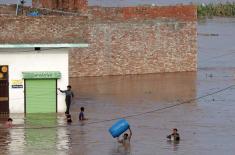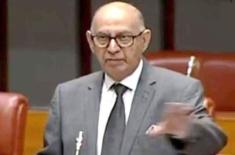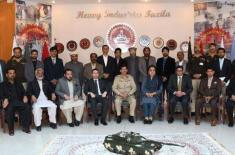
Vanishing Treasures: Old Book Centres In Federal Capital Struggle To Survive
Mohammad Ali (@ChaudhryMAli88) Published August 29, 2025 | 05:50 PM

ISLAMABAD, (UrduPoint / Pakistan Point News - 29th Aug, 2025) “In the last two decades, our sales have dropped by nearly 70 percent,” lamented Mustafa Qureshi, owner of an old book center in Islamabad’s I-8 Markaz, while speaking to APP. His words capture the deep crisis facing second-hand book markets in the capital, once bustling hubs of affordable learning and literary discovery.
Once the heart of affordable learning and leisure reading, second-hand book bazaars in Islamabad are now struggling for survival. The rapid digital shift, changing reading habits, and rising costs have pushed these markets to the brink, leaving once-busy stalls nearly deserted. Shopkeepers say what was once a thriving culture of bargain-hunting and discovery has now been replaced by the convenience of screens.
For decades, second-hand bookshops and weekly bazaars in Islamabad served as havens for students, researchers, and avid readers. From Aabpara to Melody and Jinnah Super to I-10 Markaz, these stalls once were overflowed with visiters, offering affordable textbooks, rare novels, and hidden literary gems. Today, however, many of these old book centers stand nearly empty, with sellers expressing worry over reduced sales as readers migrate to digital platforms.
One of the biggest reasons behind this decline is the shift to technology. Students and young readers increasingly rely on PDFs, online libraries, and mobile apps instead of buying hard copies. With free study material just a click away, physical books have lost their appeal. Rising tuition fees and inflation have also reduced families’ budgets for books, forcing many to buy only essential course material.
Changing reading habits add to the problem. With smartphones and social media dominating young people’s time, leisure reading has declined sharply. Visiting book bazaars, once a cherished weekend ritual, has lost its charm. Many old stalls are cramped and dusty, discouraging customers used to modern book cafes and sleek online options.
University photocopy culture has further hurt the trade. Students often prefer cheaper photocopies or scanned versions available on campuses instead of buying even second-hand reference books. Seasonal book fairs and large book stores chains also attract buyers away from smaller sellers.
Parents, too, feel the pinch in multiple ways. “When we were students, these stalls were our main source of affordable books. Now my children hardly pick up a physical book—they just study on screens,” a father of two from G-10 told APP.
Another mother pointed out the financial strain caused by frequent syllabus changes: “Every year the syllabus changes, so younger children can’t even reuse the books of their elder siblings. We are forced to buy new books at full price, which makes old book centers irrelevant and adds to our expenses.”
For shopkeepers, the situation has become dire. “Earlier, weekends meant long queues at our stalls. Now, hardly anyone comes. Everyone says they already have the book in PDF,” said Tariq, a bookseller at Melody. Another stallholder, Muhammad Arshad in I-10 Markaz, remarked, “We used to earn enough to support our families just from book sales. Now, some days I hardly sell two or three books. It’s becoming impossible to survive in this business.”
A bookseller at Jinnah Super added, “Even rare novels or history collections that once attracted readers are now gathering dust on our shelves. Young people simply don’t have the same interest.”
Farid Abbasi, who has been running a renowned Book store in F-7 Markaz for over 15 years, painted a more nuanced picture of the market. While the demand for second-hand textbooks has dropped, he said the appetite for old, rare, and out-of-print English and urdu books—such as Aag Ka Darya, Raja Gidh, and Shahab Nama—remains steady, even growing in some circles. What has collapsed almost entirely, however, is the market for magazines and newspapers. “Fifteen years ago, we stocked shelves full of sports, fashion, music, current affairs, and international magazines like Reader’s Digest, Time, Newsweek, and The Economist. Today,with so much content is freely available online ,their demand naturally decreased .” Abbasi explained. He added E-paper and digital editions of Urdu and English newspapers are now gaining popularity as readers prefer the convenience of accessing the same information instantly on their phones.
Locals who grew up visiting old book markets share a sense of nostalgia. “These bookshops were once part of Islamabad’s identity. You could find rare novels, history records, and affordable study guides here. Now it feels like that era is disappearing,” said a retired teacher from G-13.
The decline of Islamabad’s old book centers is not just an economic story—it represents the loss of cultural spaces that once fostered curiosity and connection. As the city shifts toward digital convenience and schools introduce yearly syllabus changes, questions remain over the survival of these once-vibrant literary hubs.
Recent Stories

Vivo Pakistan Appoints Khushhal Khan as Brand Ambassador for the All-New Y400

At least 20 dead, thousands displaced as devastating floods hit Punjab

Black Holes and Holy Quran: A Cosmic Convergence

Currency Rate In Pakistan - Dollar, Euro, Pound, Riyal Rates On 29 August 2025

Today Gold Rate in Pakistan 29 August 2025

A New Crypto Dawn as President Trump’s Truth Social Enters the Crypto Space

Chairman Pakistan Peoples Party (PPP) Bilawal Bhutto Zardari grieved over loss o ..

Pakistan acknowledges Trump’s role in regional peace: Senator Siddiqui

Save swat river movement rejects MHPP, calls it "Environmental Disaster"

Jam Kamal stresses modernization of insurance sector through ordinance amendment ..

RCCI to lead exporters’ delegation to bangladesh

Exceptionally high flood reported in River Ravi; Chiniot administration on high ..
More Stories From Pakistan
-
DC Sarah Javed visits schools of Sanghar, administers polio drops to children
8 minutes ago -
Vanishing treasures: Old book centres in Federal Capital struggle to survive
8 minutes ago -
President summons NA session on Sept 1
9 minutes ago -
Govt taking steps for promotion of sports: MNA
19 minutes ago -
VC FJWU assigned additional charge of VC RWU
19 minutes ago -
CM task force chief inspects Narowal jail
29 minutes ago
-
Provincial minister reviews flood relief activities in Gujrat
29 minutes ago -
Over 72,812 people rescued amidst ongoing flood emergency
29 minutes ago -
South Punjab coordinator vows implementation of Federal Ombudsman’s decisions
29 minutes ago -
Pak planning to allocate 1,000 acres to Chinese investors for Maritime Industrial Complex near Port ..
39 minutes ago -
UAF workshop stresses national plant health network for food security
39 minutes ago -
Governor lauds efforts to eradicate hepatitis
48 minutes ago